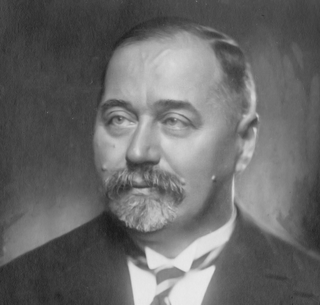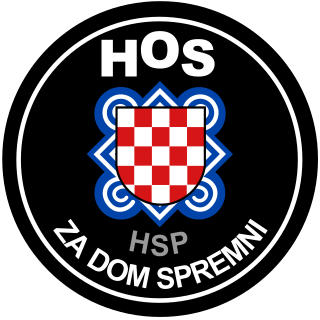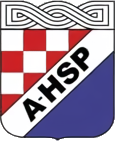The Ustaše, also known by anglicised versions Ustasha or Ustashe, was a Croatian fascist and ultranationalist organization active, as one organization, between 1929 and 1945, formally known as the Ustaša – Croatian Revolutionary Movement. Its members murdered hundreds of thousands of Serbs, Jews, and Roma as well as political dissidents in Yugoslavia during World War II.

The Independent State of Croatia was a World War II-era puppet state of Nazi Germany and Fascist Italy. It was established in parts of occupied Yugoslavia on 10 April 1941, after the invasion by the Axis powers. Its territory consisted of most of modern-day Croatia and Bosnia and Herzegovina, as well as some parts of modern-day Serbia and Slovenia, but also excluded many Croat-populated areas in Dalmatia, Istria, and Međimurje regions.

Stjepan Radić was a Croat politician and founder of the Croatian People's Peasant Party (HPSS), active in Austria-Hungary and the Kingdom of Serbs, Croats and Slovenes.

Jure Francetić was a Croatian Ustaša Commissioner for the Bosnia and Herzegovina regions of the Independent State of Croatia (NDH) during World War II, and commander of the 1st Ustaše Regiment of the Ustaše Militia, later known as the Black Legion. In both roles he was responsible for the massacre of Bosnian Serbs and Jews. A member of Ante Pavelić's inner circle, he was considered by many Ustaše as a possible successor to Pavelić as Poglavnik (leader) of the NDH. He died of wounds inflicted when he was captured by Partisans near Slunj in the Kordun region when his aircraft crash-landed there in late December 1942.

Lesbian, gay, bisexual, and transgender (LGBT) rights in Croatia have expanded in recent years, but LGBT persons still face some legal challenges not experienced by non-LGBT residents. The status of same-sex relationships was first formally recognized in 2003 under a law dealing with unregistered cohabitations. As a result of a 2013 referendum, Croatia's Constitution defines marriage solely as a union between a woman and man, effectively prohibiting same-sex marriage. Since the introduction of the Life Partnership Act in 2014, same-sex couples have effectively enjoyed rights equal to heterosexual married couples in almost all of its aspects. In 2022, a final court judgement allows same-sex couples to adopt jointly. Same-sex couples in Croatia can also apply for step-child adoption and foster care. Croatia bans all discrimination on the grounds of sexual orientation, gender identity, and gender expression.

The Catholic Church in Croatia is part of the worldwide Catholic Church that is under the spiritual leadership of the Pope, Roman Curia and the Croatian Bishops' Conference. Its administration is centered in Zagreb, and it comprises five archdioceses, 13 dioceses and one military ordinariate. Cardinal Josip Bozanić is the Roman Catholic Archbishop of Zagreb.
Croatian Pure Party of Rights is a far-right political party in Croatia founded in 1992. The party claims to be an ideological descendant of the identically named right-wing Serbophobic historical party which was active in the early 20th century and which advocated the right to self-determination for Croatia at the time when it was part of Austria-Hungary and Kingdom of Yugoslavia.

Vladimir "Vlado" Gotovac was a Croatian poet and politician.
Slaven Letica was a Croatian author, economist, commentator and politician.
Miroslav Rožić is a Croatian right-wing politician. As a former vice-president of Croatian Party of Rights (HSP), he served as a representative in Croatian Parliament between 2001 and 2007. He was previously a member of the Croatian Social Liberal Party (HSLS) and is currently a member of the Croatian Peasant Party (HSS).

The Croatian Defence Forces were the paramilitary arm of the Croatian Party of Rights (HSP) from 1991 to 1992, during the first stages of the Yugoslav wars. During the Croatian War of Independence, the HOS organized several early companies and participated in Croatia's defense. At the peak of the war in Croatia, the HOS was several battalions in size. The first HOS units were headed by Ante Paradžik, an HSP member who was killed by Croatian police in September 1991. After the November 1991 general mobilization in Croatia and the January 1992 cease-fire, the HOS was absorbed by the Croatian Army.
Far-right politics in Croatia refers to any manifestation of far-right politics in the Republic of Croatia. Individuals and groups in Croatia that employ far-right politics are most often associated with the historical Ustaše movement, hence they have connections to Neo-Nazism and neo-fascism. That World War II political movement was an extremist organization at the time supported by the German Nazis and the Italian Fascists. The association with the Ustaše has been called "Neo-Ustashism" by Slavko Goldstein.

Za dom spremni! was a salute used during World War II by the Croatian Ustaše movement. It was the Ustaše equivalent of the fascist or Nazi salute Sieg heil.
The Croatian Committee was a Croatian revolutionary organization, formed in the Summer of 1919, by émigré groups in Austria and Hungary, in opposition to the creation of the Kingdom of Serbs, Croats and Slovenes (Yugoslavia) and devoted to Croatia's secession from the kingdom. The Croatian Committee and its armed branch the Croatian Legion were dissolved in 1920, some of its members later joined the fascist Ustasha organization.

The Holocaust in the Independent State of Croatia involved the genocide primarily of Jews, and also the genocide of Serbs and Romani (Porajmos), within the Independent State of Croatia, a fascist puppet state which existed during World War II, was led by the Ustaše regime, and ruled an occupied area of Yugoslavia which included most of the territory of modern-day Croatia, the whole of modern-day Bosnia and Herzegovina and the eastern part of Syrmia (Serbia). Of the 39,000 Jews who lived in the NDH in 1941, the United States Holocaust Memorial Museum states that more than 30,000 were killed. Of these, 6,200 were shipped to Nazi Germany and the rest of them were killed in the NDH, the vast majority were killed in Ustaše-run concentration camps, such as Jasenovac. The Ustaše were the only quisling forces in Europe who operated their own extermination camps for the purpose of killing Jews and members of other ethnic groups.

Split Pride is the LGBT pride march in the Croatian city of Split. Split was the second city in Croatia after Zagreb to get its LGBT pride, with the first taking place on the 11 June 2011.

Zlatko Hasanbegović is a Croatian politician and historian who has served as a member of the Croatian Parliament since 2016. He served as Minister of Culture in the cabinet of Tihomir Orešković from 22 January to 19 October 2016. Hasanbegović is also a member of the Zagreb Assembly and one of the founders of the Independents for Croatia party.
2014–2016 Croatian war veterans tent protest was 555 days long war veterans protest, often dubbed in Croatia as The Tenters. The protests were initially aimed against Ministry of Croatian Veterans deputy Bojan Glavašević and Minister Predrag Matić himself, however the protesters subsequently changed their demands and started demanding the resignation of left-wing Prime Minister Zoran Milanović and then President Ivo Josipović. The protests escalated in May 2015 when a group of protesters breached the riot police cordons in Zagreb Upper Town and barricaded themselves inside St. Mark Church, where they again clashed with the police. At the same time another group of protesters near the central tent blocked the traffic and brought out gas bottles on Savska street which they apparently threatened to blow if the police refused to back off from the church. After both Josipović and Milanović lost the elections in 2014 and 2015, the protests gradually calmed down and in April 2016, with the new minister taking over the Veterans Office, the tent was dismantled, formally ending the protest.

Hrvoje Klasić is a Croatian historian. Since 2003, Klasić is a professor at the Department of History at the Faculty of Humanities and Social Sciences of the University of Zagreb. His work focuses on contemporary Croatian and world history. Klasić is a critic of attempts at rehabilitation of the World War II fascist Ustasha movement in the country. He is ambassador for the European Association of History Educators.
Anarchism in Croatia first emerged in the late 19th century within the socialist workers' movement. Anarchist tendencies subsequently spread from neighboring countries, taking root in a number of cities throughout the country. The movement experienced repression from a succession of authoritarian regimes before finally reemerging around the time of the independence of Croatia.












